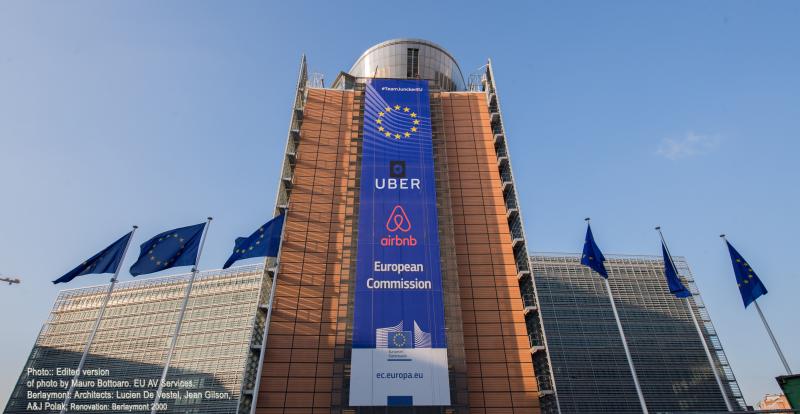
Gig economy lobbies fight regulation, as workers and consumers pay the price
As gig economy companies are spending more than ever on lobbying the EU, a new study today shows how the likes of Uber and AirBnB are fighting the regulation of their sector in Europe. “Uber Influential” reveals lobbying tactics of the billion-dollar corporations, whose business depends on the exemption from social and workers’ rights laws, as well as the tax rules that apply to their analogue competitors.
Across Europe, an estimated 10% of the workforce are now earning some of their income with the help of tech solutions provided by gig economy companies. But the rapid rise of the gig economy and its companies is based on their systematic lobbying to avert any meaningful regulation of the sector, Corporate Europe Observatory and the Austrian Chamber of Labour warn in this latest publication.
The platform companies’ strategy has found fertile ground at the European Commission. A rather single-minded view of the corporate ‘sharing economy’ championed by Uber, Airbnb, Deliveroo, TaskRabbit and others has led the institution to assist platforms in fighting any attempt to control their operations.
In Brussels, these platform companies have in recent years intensified their lobbying to remain exempt from the EU’s E-Commerce Directive and its Services Directive and thus escape regulation at regional, national and EU levels. This has exacerbated the precarious situation of the sectors’ workers and is eroding social rights across the EU.
Connecting the dots between these big regulatory blind spots and the sector’s fast increasing activities in Brussels, “Uber Influential” provides a compelling glimpse into the tactics and consequences of coordinated EU lobbying efforts by a novel industry receiving European Commission help to avoid regulation - at the expense of EU citizens.
Corporate Europe Observatory’s researcher and campaigner Kenneth Haar said:
“There is a need for a new European approach to the platform economy. Creating a safe haven for huge companies such as Uber and Airbnb to escape the rules others have to follow is grotesque and comes at a high price for workers, consumers, and analogue competitors. Politicians across Europe have to take control over gig economy rules, and end the laissez-faire modus of the Commission and the courts we’ve been seeing.”
Frank Ey, expert on EU affairs at the Austrian Chamber of Labour added:
“The new EU Commission must show more respect for workers’ rights and the interests of the general public rather than only listening to business lobbyists. Technological innovation should no longer be used as a pretext for creating new precarious working conditions, and digitalisation mustn’t serve as a buzzword to whitewash the erosion of labour and social rights or tax evasion.”
Contact:
Kenneth Haar, Corporate Europe Observatory, kenneth@corporateeurope.org, +45 2360 0631
Notes to editors:
-
Read “Uber Influential” in full here.
-
A German-language summary of the report has been provided by the Austrian Chamber of Labour and is available here.
-
Key statistics from the report:
-
Uber alone has paid the Commission’s top-level officials 50 visits since 2015, and in 2016 even won former Commissioner for the Digital Agenda and Commission Vice President Neelie Kroes for its public policy advisory board, a role for which she reportedly received company shares.
-
AirBnB lobbyists have also made sure to meet 17 times with the Commission’s top level during that same period. The short-term rental platform, like Deliveroo and other smaller gig economy actors, also relies heavily on membership in trade associations and on lobby consultancies to get its way in Brussels.
-
DigitalEurope and BusinessEurope respectively held a staggering 119 and 204 lobby meetings with the Commission on behalf of gig economy companies.
-
-
Where more rigorous national or regional regulation has made up for lax EU rules on short-term letting, AirBnB has already taken legal action. A judgement by the European Court of Justice on cases filed by AirBnB against several European cities is imminent. More information is available here.
